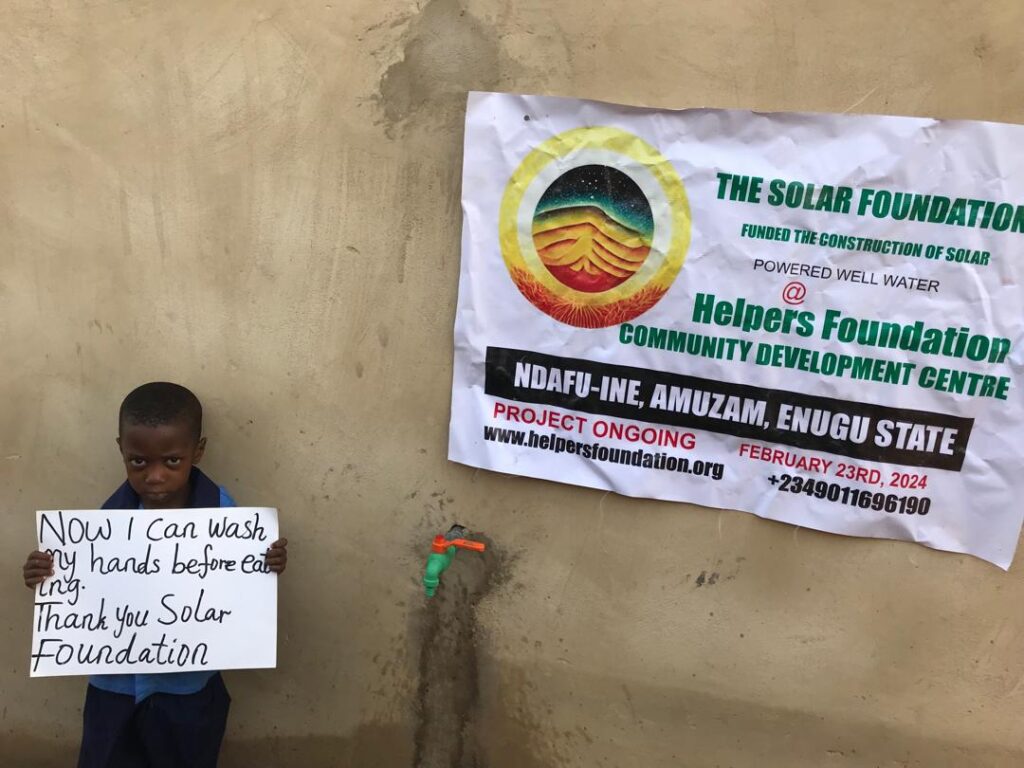How The Solar Foundation solar-powered pump water is changing lives in Nigeria. 2.5 million residents of Enugu state do not have access to the most basic water services. This lack of access to clean water means that many residents must subsequently rely on polluted water sources for cooking, bathing, and cleaning. m. A lack of proper hygiene services, open defecation, and a lack of sanitation becomes prominent when basic water services are absent. The lack of access to clean water has compounding effects on the economy, the agricultural and farming sectors, and health. This is a major issue that demands immediate attention. In 2020, the state declared a state of emergency in regard to the lack of water, sanitation, and hygiene resources. Many Nigerians have a hard time getting clean water every day. Relying on unreliable electricity systems or far-away, often dirty sources has been a problem for a long time. But there is some good news – solar-powered water pumps are starting to be used. This new technology is making a big difference in people’s lives all over the country. It’s making things better for people’s health, education, and economic opportunities.
The Burden of Water Scarcity
Historically, rural areas in Nigeria have struggled to find enough water. Women and children usually suffer the most from this problem. They have to spend a lot of time getting water from far away, which can make them sick and also stop them from going to school or working to make money. Dirty water makes things worse, causing diseases like diarrhea, cholera, and typhoid.
Harnessing the Power of the Sun
Solar-powered water pumps are a really helpful solution that can make a big difference. These pumps use panels to change sunlight into electricity. This electricity runs the pumps that get water from underground. Solar-powered systems are better than traditional pumps because they are clean, dependable, and save money in the long run. They don’t need diesel generators or unreliable grid electricity.
Empowering Communities with Clean Water
 The benefits of solar-powered water pumps extend far beyond simply providing access to clean water. Here’s a closer look at the transformative impact they’re having on Nigerian communities:
The benefits of solar-powered water pumps extend far beyond simply providing access to clean water. Here’s a closer look at the transformative impact they’re having on Nigerian communities:
- Improved Health: Clean water is essential for basic hygiene and sanitation, leading to a significant reduction in waterborne diseases. This translates to healthier families, fewer missed school days for children, and a more productive workforce.
- Education and Empowerment: With less time spent fetching water, girls can attend school more regularly, enhancing their educational opportunities and long-term prospects. Additionally, women are freed from this time-consuming chore, allowing them to pursue income-generating activities or participate in community development initiatives.
- Economic Growth: Reliable access to water fosters agricultural productivity. Farmers can now irrigate their crops more efficiently, leading to increased yields and income. Additionally, the presence of a clean water source can attract small businesses and entrepreneurs, further boosting the local economy.
- Community Development: Solar water pumps often come with community ownership models. Locals are trained on pump maintenance and operation, fostering a sense of ownership and responsibility for the system. This collaborative approach strengthens communities and empowers them to manage their water resources effectively.
Control Switches: Ensuring Sustainability
One crucial aspect of a successful solar-powered water pump project is the implementation of control switches. These switches allow for the regulation of water flow and pump operation. They serve several key purposes:
- Preventative Maintenance: Control switches can be programmed to automatically shut off the pump during low water levels or equipment malfunctions. This protects the pump from damage and extends its lifespan.
- Water Conservation: Switches can be set to operate the pump only during specific times of the day, preventing overuse and ensuring the sustainability of the water source.
- Fair Distribution: In some cases, control switches can be integrated with a pre-paid system, allowing for a fair and controlled distribution of water amongst community members. This fosters a sense of responsibility and discourages water wastage.
Challenges and the Road Ahead
While solar-powered water pumps offer a powerful solution, challenges remain. The initial cost of installing the system can be a barrier for some communities. Additionally, technical expertise for maintenance and repairs might be limited in remote areas. To address these challenges, collaborative efforts are needed between government agencies, NGOs, and the private sector.
- Financial Support: Government subsidies or microloans can make solar water pumps more accessible for communities.
- Capacity Building: Training programs can equip locals with the necessary skills to maintain and repair the pumps, ensuring long-term sustainability.
- Public-Private Partnerships: Collaboration between the public sector and private companies can leverage resources and expertise for wider implementation.
A Beacon of Hope: Empowering Women and Girls
Solar-powered water pumps hold immense potential for empowering women and girls in Nigerian communities. Traditionally, the responsibility of collecting water often falls on women and girls, hindering their education and economic opportunities. With access to clean water closer to home, they are freed from this burden, allowing them to pursue education, and income-generating activities, and participate more actively in community development. This fosters gender equality and empowers women to contribute meaningfully to the social and economic fabric of their communities.
A Ripple Effect of Change
Solar-powered water pumps are not just technological marvels; they represent a beacon of hope for a brighter future in Nigeria. By providing access to clean water, they empower communities, unlock economic opportunities, and pave the way for a healthier and more sustainable future. As the technology continues to evolve and become more affordable, the ripple effect of solar water pumps has the potential to reach every corner of the country. This journey towards a water-secure future requires continued collaboration between government, NGOs, the private sector, and local communities. By working together, we can ensure that clean water, a fundamental human right, becomes a reality for all Nigerians.
The impact of The Solar Foundation in rural communities in Nigeria
The Solar Foundation has been at the forefront in providing solar-powered pumps to the residents of Enugu state. According to the website, the main purpose of the organization is to utilize various technologies, such as blockchain and scale-off grid solar in rural communities and emerging
economies. The organization has been instrumental in providing solar power to underrepresented and underserved communities, including through pumps, solar panels and computer labs for instance. The Solar Foundation funded our organization and initiated the construction of well water in addition to a solar pump for the pumping of the water at a newly constructed school called Havilah View Nursery and primary school. Through this funding, the school has been able to have access to clean and safe water for the residents. The Solar Foundation intervention further provided electricity for the community, giving the community the chance to be able to have access to computer technology and working lights. The solar foundation has played a key role in providing the community with the resources they require, and the capacity to change lives in the process! Solar powered pumps are instrumental in providing residents with access to clean and safe water; a basic human right. The Solar Foundation has played an important role in providing residents with access to solar pumps and technology to be used for a variety of purposes. The global fight for the alleviation of water scarcity requires multifaceted approaches, including NGO organizations, the efforts of local governments and state governments. The Helpers Social Development Foundation plays an important role in the fight for the alleviation of water scarcity, promoting access to clean and
safe drinking water for the people of Enugu State, Nigeria. Consider making a donation to the foundation today to help more families access this basic, necessary resource

